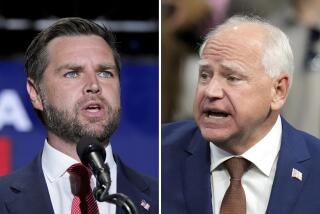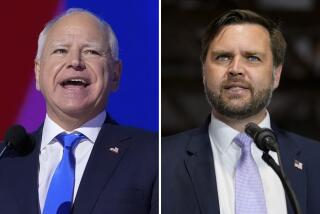7 Democratic Contenders Debate on TV Tonight
- Share via
WASHINGTON — Now the winnowing begins.
For the first time, the seven Democratic presidential contenders debate one another over national television tonight, ushering in a more competitive phase of the 1988 campaign in which the candidates will strive to define themselves and redefine their party.
“It’s the most important event since Gary Hart dropped out of the race,” Paul Tully, political director for Massachusetts Gov. Michael S. Dukakis, said of the two-hour televised confrontation in Houston, which will begin at 6 p.m. PDT and be carried on Los Angeles public television station KCET at 9 p.m.
Chance to Expand Gains
Similar encounters are expected in key states in the months ahead, with NBC News planning a full-scale national confrontation of Republicans as well as Democrats in December. For the more successful candidates so far--namely Dukakis, who rushed through the critical finishing touches on his state budget so that he could make it to Houston in time, civil rights leader Jesse Jackson and Missouri Rep. Richard A. Gephardt--tonight’s debate offers an opportunity to consolidate and expand their gains.
They will be trying to impress the biggest audience any of them has yet reached--perhaps as many as 10 million households, said Barry Chase, spokesman for the Public Broadcasting Service.
As for those candidates who appear to have had trouble getting started, such as Illinois Sen. Paul Simon, former Arizona Gov. Bruce Babbitt, Delaware Sen. Joseph R. Biden Jr. and Tennessee Sen. Albert Gore Jr., the rendezvous in Houston assumes an air of urgency.
“We’re taking it every seriously,” said Jim Killpatrick, press secretary to Simon. “It’s the first serious occasion” for passing judgment on the seven candidates, he said.
Race Lacking in Focus
Until now, the Democratic race has lacked focus, partly because few people know much about the candidates, but also because the party has lost the ideological compass that gave it direction and energy during the heyday of traditional liberalism.
In 1984, the Democratic campaign was mainly an argument over the liberal doctrines espoused by Walter F. Mondale and challenged by Gary Hart. Although Mondale won the nomination, he ultimately lost the presidency--and the argument.
What the Democrats are left with is a group of candidates sharing a blurry and cautiously moderate consensus on policy issues.
“It’s boring . . . that so many people are thinking alike and there is so little controversy,” said Lanny J. Davis of Maryland, who organized a meeting of Democratic National Committee members from the East, at which Jackson, Dukakis and Gore spoke, along with Colorado Rep. Patricia Schroeder, who is considering entering the race.
On the key domestic issue of federal budget deficit reduction, all the Democrats say there is a need to increase revenues. But most talk about such relatively mild approaches as oil import fees or, in Dukakis’ case, stepped-up tax enforcement, a far cry from the pledge to boost income taxes across the board that was the centerpiece of Mondale’s 1984 campaign.
The issue that has gained the most attention so far among the candidates is trade. And the candidate who has received the most attention from trade is Gephardt, by sponsoring a hard-line measure for retaliating against countries that are found to use unfair commerce practices against the United States.
Arcane Trade Plans
However, even though the other candidates generally decry Gephardt’s alleged protectionism--he himself disavows that label--most of them have some proposal of their own to help promote what they call “fair trade.” And the various plans are all so arcane that it is difficult for most voters to distinguish one from another.
But this is a lull that party professionals expect will not last much longer. As Democrats themselves acknowledge, simply rejecting their past is not sufficient to regain the confidence of the electorate. Instead, as Davis of Maryland told the Eastern national committee members: “We must remain the party of compassion. And we must also be the party of fiscal caution and sensitivity to the burdens of the taxpayer.”
Sharp Debate
Fashioning a message that reconciles those two imperatives will not be easy, nor can it be seriously attempted without sharp debate. And the competition’s mounting intensity seems almost certain to gradually push the contenders into more fractious exchanges.
Hardly anyone expects the Houston encounter to be a repetition of some of the harsh exchanges of the 1984 Democratic campaign debates, first between Mondale and Ohio Sen. John Glenn and then between Mondale and Hart over the durability of the party’s liberal doctrines.
“If any candidate becomes overly caustic in Houston, he’ll be the loser,” said Fred Duvall, campaign manager for Babbitt.
The show is expected to get off to a sedate start. The candidates already have been told the first question: Which of the five presidential portraits--those of Taft, Hoover, Eisenhower, Lincoln and Jefferson--now hanging in the Cabinet Room would they remove and whose picture would they add.
This opening gambit, along with taped biographies of the candidates and 10 minutes of the candidates on the hustings, will leave about 40 minutes for answering questions from the two interrogators, conservative commentator William F. Buckley Jr. and former Democratic National Chairman Robert S. Strauss, in a special edition of Buckley’s “Firing Line” program.
The candidates will get the chance to comment on their rivals’ answers, and Rocky Mountain, a partner in Southern Political Consulting, the Houston consulting firm that conceived the program, contends that the result will be “a lot more lively and more entertaining” than the debates produced in the past under sponsorship of the League of Women Voters.
On the eve of the 1988 Democratic presidential campaign’s national television premiere, here’s a glimpse of the prospects of the three leading contenders and of the chances for the others of catching up:
DUKAKIS--His most striking achievement so far has been to continue to meet his responsibilities as governor while getting his campaign for the White House off to a flying start, particularly in the vital area of fund raising. Campaign manager John Sasso said Dukakis has raised $4 million in the quarter that ended Tuesday, which would put him about $1 million ahead of his nearest financial competitor, Sen. Biden.
But Dukakis will face increasing challenges from his rivals, quite possibly in tonight’s debate, about his claims to have contributed significantly to his state’s economic success. And he will also be pressed to demonstrate how his programs for Massachusetts can solve the diverse problems of the other 49 states.
GEPHARDT--His two major assests are involvement with the trade issue and his support from House colleagues, and Gephardt has made the most of them, turning strategic Iowa into a stronghold. Now, though, as campaign manager William Carrick acknowledges, he has to demonstrate that he is “someone with vision,” never any easy task.
Some analysts depict Gephardt as the chief populist among the 1988 contenders. But critics say he is too cautious and drab to make much of a populist. Physically, he cuts an unprepossessing figure, as he himself tacitly conceded recently with a facetious explanation of his reasons for writing legislation restricting colorization of old films. “In black and white,” Gephardt said, “I have eyebrows.”
JACKSON--Hart’s withdrawal from the campaign made Jackson the leader in the polls. His own discipline and restraint, more of which he is expected to display on television tonight, have gained him a measure of respectability. “The mainstream is moving in Jackson’s direction,” press secretary Frank Watkins claims.
But others say Jackson has done most of the moving--dropping his complaints against party rules, disavowing black Muslim leader Louis Farrakhan and urging pension fund investment in basic public works projects rather than big federal grants to boost the economy. But the problem for Jackson, rival strategists say, is that his moderation may cost him some of the black support he won in 1984 as a militant spokesman for the dispossessed.
Each of the other four candidates in the race has potential opportunities to improve his standing, though not without risk.
Babbitt is counting heavily on a $250,000 investment in television, telephone canvassing and direct mail in Iowa. The expenditure could give him a big lift in the state if it works--or seriously damage his chances there if it falls short.
Biden, chairman of the Senate Judiciary Committee, will get plenty of public attention while presiding over the confirmation hearings for President Reagan’s choice to fill the current Supreme Court vacancy. But Biden will have to handle himself with great skill to make up for the time he will lose from the campaign trail.
As long as Gore remains the only white Southerner in the race, the Super Tuesday primary in March, when 14 Southern states pick their delegates, will be a beacon of hope. But, if his fellow Southerner, Georgia Sen. Sam Nunn, decides to enter the contest, that light may go out for Gore.
With his sober style and straight-arrow approach to the party’s traditional principles, Paul Simon is clearly bucking the trend toward appeals to the baby boom generation. The odds may well be stacked against him, but at 58 Simon may feel he has no other option.
More to Read
Get the L.A. Times Politics newsletter
Deeply reported insights into legislation, politics and policy from Sacramento, Washington and beyond. In your inbox twice per week.
You may occasionally receive promotional content from the Los Angeles Times.










